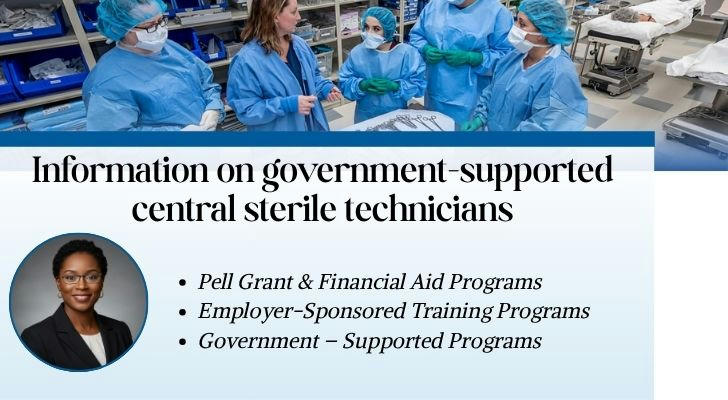Exploring Central Sterile Processing Technician Courses and Available Assistance Pathways
Central sterile processing technicians are a vital part of the healthcare system. This position requires no advanced education and offers stable career advancement. If you're unsure where to start, this article will help you find out about available government-supported training programs and practical financial support options to make your journey easier.

Career Outlook & Work Environment Overview
| Item | Details |
|---|---|
| Average Salary | $42,000–$58,000/year (depending on region and experience) |
| Work Settings | Hospitals, surgical centers, clinics, dental labs |
| Job Growth | Projected growth over 6% between 2022 and 2032 (BLS data) |
| Career Pathways | → Manager of sterile processing → Instrument validation specialist → Clinical supply chain coordinator |
| Nature of Work | Shift work, often on feet; attention to detail and strict procedure adherence |
Benefits of Central Sterile Processing Technician Training
- Short training period: Earn certification in just a few months
- High job demand: Growing need in surgical support roles
- Controlled work environment: Minimal direct patient contact, moderate stress levels
- Clear career progression: Advance into roles in coordination, quality, or supply chain
Ways to reduce training costs and practical government support programs
1️⃣ Government – Supported Programs
| Project Name | Support Provided | Requirements | Credential Support |
|---|---|---|---|
| Houston Community College | Offers full training materials and career guidance | Admission assessment and career matching required | Includes certification exam support |
| Lincoln Land Community College | State-supported program for residents to gain job skills | Program enrollment and basic background check | Certification exam prep and career services included |
2️⃣ Pell Grant & Financial Aid Programs
| Project Name | Support Provided | Requirements | Credential Support |
|---|---|---|---|
| Lindsey Hopkins Technical College | Offers federal Pell Grant application assistance and financial aid | Requires FAFSA application, high school diploma or GED | Supports exam prep and provides certificate |
| Contra Costa Medical Career College | Provides access to federal Pell Grant and Title IV aid | FAFSA eligibility, enrollment into SPS program | Offers completion certificate |
| DuPage Futures Scholarship | Scholarship for low-income students to assist tuition | Residency in DuPage, must pursue career training | Recognizes completion certificate and aids job readiness |
3️⃣ Employer-Sponsored Training Programs
| Project Name | Support Provided | Requirements | Credential Support |
|---|---|---|---|
| JVS Boston | Partnered training with employers; includes salary sponsorship | Massachusetts residency, pass pre-screening | Includes certification exam prep and simulations |
| St. Louis Community College | Employer-linked training; employment referrals post-course | 18+, interest or work experience in sterile processing | Provides occupational training certificate upon completion |
Age Groups & Suitability for This Training
| Age Range | Characteristics | Recommendation |
|---|---|---|
| 18–25 | Newly entering workforce, limited experience | Low barrier to entry, quick employment start, growth potential |
| 26–35 | Career changers, beginning family responsibilities | Short training period provides stable job transition |
| 36–50 | Established career, seeking growth | Experience and reliability are assets in healthcare roles |
| 50+ | Re-entering workforce or seeking purposeful second career | Healthcare industry stability and part-time flexibility |
Frequently Asked Questions
Q1. Can I learn if I have no medical background? A: Yes. The sterile processing technician course is designed for beginners and emphasizes operational standards and instrument management.
Q2. How long does the training take? A: Typically 3–6 months; accelerated programs can be completed in about 8 weeks.
Q3. Can I find a job upon completion? A: Most programs include job placement assistance and internship referrals to help graduates transition into employment.
Q4. Is a national certification required? A: Not universally required, but many employers prefer candidates with CBSPD or IAHCSMM credentials.
Conclusion: Start a Stable Healthcare Career Path
Whether you're a recent high‑school graduate, considering a career change, or returning to the workforce, the sterile processing technician role offers a practical, in‑demand healthcare career option. With the assistance programs listed above, you can pursue this training at reduced cost and step into a profession with strong growth potential.
Explore the linked programs to learn more or reach out to institutions for guidance. Your future in healthcare starts here.
